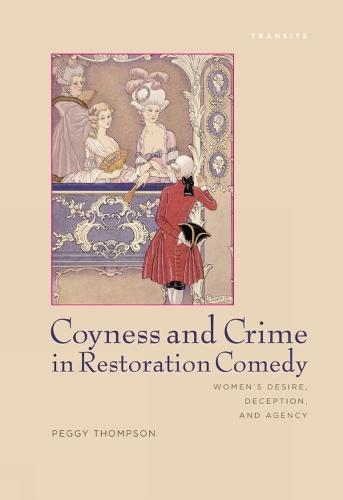Full Product Details
Author: Peggy Thompson
Publisher: Bucknell University Press
Imprint: Bucknell University Press
Dimensions:
Width: 16.30cm
, Height: 1.90cm
, Length: 23.80cm
Weight: 0.440kg
ISBN: 9781611483727
ISBN 10: 1611483727
Pages: 202
Publication Date: 23 November 2011
Audience:
College/higher education
,
Postgraduate, Research & Scholarly
Format: Hardback
Publisher's Status: Active
Availability: In Print

This item will be ordered in for you from one of our suppliers. Upon receipt, we will promptly dispatch it out to you. For in store availability, please contact us.
Reviews
In allowing female actors to appear on stage, the Restoration may have marked a watershed moment in English theater history, but this did not mark a corresponding improvement in social attitudes toward women. As Thompson (Agnes Scott College) expertly documents, a wide range of late-17th-century comedies contested some as basic as a woman's right to say 'no' to persistent/unwelcome suitors. The author identifies what she terms the 'trope of insincere resistance,' a motif whereby a woman's 'no' actually means 'yes,' and female characters conceal insatiable desire behind masks of false modesty. After tracing the evolution of this pernicious trope through conduct literature of the period, Thompson charts how comic types and stock situations in drama reflected and reinforced gendered inequities in society. Chapters document that some of the era's best-loved dramatists--Wycherley, Dryden, Shadwell, Congreve, Southerne, Vanbrugh--wrote plays curtailing woman's sexual freedom and social options. Even Aphra Behn proves a traitor to her sex, depicting romantic love as mercenary self-interest, and affirming 'the prerogative of well-born men by implicitly blessing their sexual aggression in the face of women's denials.' Meticulously researched, clearly organized, methodically argued, this book strips the veils of elegance and wit from Restoration theater, exposing dismaying prurience, misogyny, and exploitation. Summing Up: Highly recommended. Graduate students, researchers. CHOICE
In allowing female actors to appear on stage, the Restoration may have marked a watershed moment in English theater history, but this did not mark a corresponding improvement in social attitudes toward women. As Thompson (Agnes Scott College) expertly documents, a wide range of late-17th-century comedies contested some as basic as a woman's right to say 'no' to persistent/unwelcome suitors. The author identifies what she terms the 'trope of insincere resistance,' a motif whereby a woman's 'no' actually means 'yes,' and female characters conceal insatiable desire behind masks of false modesty. After tracing the evolution of this pernicious trope through conduct literature of the period, Thompson charts how comic types and stock situations in drama reflected and reinforced gendered inequities in society. Chapters document that some of the era's best-loved dramatists--Wycherley, Dryden, Shadwell, Congreve, Southerne, Vanbrugh--wrote plays curtailing woman's sexual freedom and social options. Even Aphra Behn proves a traitor to her sex, depicting romantic love as mercenary self-interest, and affirming 'the prerogative of well-born men by implicitly blessing their sexual aggression in the face of women's denials.' Meticulously researched, clearly organized, methodically argued, this book strips the veils of elegance and wit from Restoration theater, exposing dismaying prurience, misogyny, and exploitation. Summing Up: Highly recommended. Graduate students, researchers. CHOICE Peggy Thompson offers a new understanding of female sexual agency and female sexual consent on the Restoration stage. In Coyness and Crime in Restoration Comedy: Women's Desire, Deception, and Agency, Thompson analyses what she terms 'the trope of insincere resistance' (p. 3), the product of a culture that forces women to refuse sexual acts they actively desire. Thompson's book is compelling, and it convincingly enumerates the many ways in which women were forced to perform resistance and then mocked or punished for their supposed virtue. Seventeenth-Century News
Author Information
Peggy Thompson has written on Restoration and eighteenth-century drama, fiction, and poetry. Her work has appeared in Studies in Philology; SEL: Studies in English Literature, 1500-1900; Restoration: Studies in Literary Culture, 1660-1700; Eighteenth-Century Fiction and elsewhere. She is the Ellen Douglass Leyburn Professor of English at Agnes Scott College.



